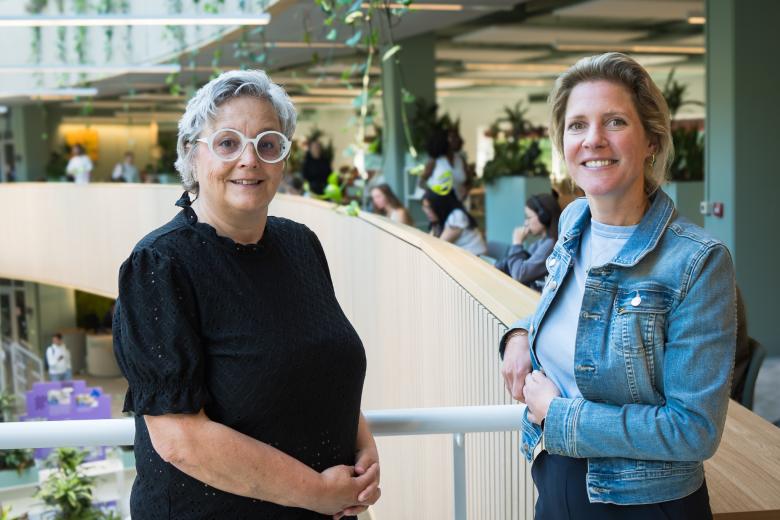Babysitting service by students
Emma Sanders and Vera Kleinveld, two clinical interns in the first year of their master’s in Medicine, are busy. Only not as planned with clinical rotations. As for all of us, their world has changed drastically since the corona outbreak.
Because the MUMC+ was one of the first hospitals where surgery clinical inters were no longer allowed to work because of the corona virus, Vera’s 'Surgery/Cutting' clinical rotation ended abruptly a few weeks ago. Before it even begun. Housemate Emma’s 'Reflection' clinical rotation in the Laurentius Hospital in Roermond lasted a bit longer, until 16 March.
It was Emma who pointed out to Vera the vacancy at the GGD (municipal medical service) in which they were looking for master’s students to staff the corona call centre. Since then, she has had people on the phone who worry about possible corona symptoms they might have. She offers a listening ear and advises or reassures them. Like the older lady who calls regularly because she is concerned about her health. But she also answers the most diverse questions from employers.
When Maastricht University announced that all clinical rotations would stop until further notice, this also meant the end of Emma's clinical rotation. She could start right away at the GP post in Heerlen. Here she sees patients (sometime also suspected corona patients) who come to the out-of-hours GP centre, emergency department and pharmacy. From behind the glass of the desk, she checks as closely as possible whether the patient is showing any corona symptoms. Via the intercom, she tells patients where to go to in the hospital and she also conveys the difficult message that they always have to go in alone.
On Sunday evening 15 March, Emma and Vera heard the news that the schools would remain closed until 6 April. Immediately after the press conference, they started their plan to recruit students who could look after families of care workers. The website went live the same evening. The following days they approached hospitals in the region and GP organisations (with 180 affiliated practices). Although not everyone thought they needed the service right away and sometimes internal consultation with the crisis team was needed, the reactions were mostly positive.
There are now almost 200 students who have registered. The majority studies Medicine. About 30 students have already been linked to a family. Given the task to limit social contacts as much as possible, they do their utmost to link one, maximum two students to a family. For each request, they take the data of the student who has registered first. Then there is a manual check on a whole list of criteria. Among other things, how many days the family needs a babysitter, whether the babysitter should have experience with babies, whether there is a preference for a particular language, the travel time and if the student is also willing to babysit during night shifts. All in all quite a puzzle.
The most special match until now? Someone who was looking for a nanny for a six-year-old with brown hair for several days a week. A car was not necessary because the address was easily accessible by public transport. It turned out to be a six-year-old four-legged friend who had to be walked several times a week. And so, Vera and Emma regularly receive photos and videos of a student walking a dog called ‘Dapper’ (which translates as ‘Brave’).
Because the number of students who want to babysit is (for the time being) bigger than the number of families looking for babysitting assistance, Emma and Vera have expanded their field of activity to Maastricht University. So if you as an employee of our university are in need of a babysitter and live in South Limburg feel free to contact them. The student babysitters might even be able help out with your children’s schoolwork.
These are special times for Vera and Emma, who only know about an outbreak like this from stories from countries such as Africa and South America where the healthcare system is not that well organised. “You never expect something like this to happen in your own country. We learn more about bacterial lung infections than about viral ones. But that might just change in the future.”
Register? Visit www.https//studentenoppas.wordpress.com
Also read
-
Study Smart gets Dutch Education Premium
Maastricht University's (UM) interfaculty educational innovation project Study Smart is one of the three winners of the Dutch Education Premium 2025. This was announced on Tuesday during the Comenius festival in The Hague.

-
Randwyck Library and the river of knowledge
Monique Notermans and Meike Kerkhofs-Welkenhuizen witnessed the vision behind a modern library come to life.

-
Is the risk of cancer the same for everyone?
Valery Lemmens (GROW) conducts research on cancer, prevention, and how society is designed for making unhealthy choices.
